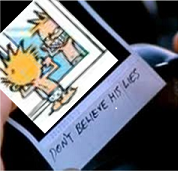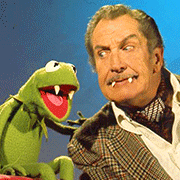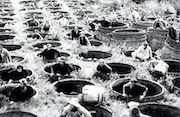|
Hodgepodge posted:
Doesn't matter if most of them are still white. I touched on this in another thread but I've been reading about the history of Hispanics in Texas, and Texas/Latin America under Spain is remarkably similar to racial attitudes today. There was a clear racial hierarchy (Whites > Indians > Blacks with the mixed people somewhere between all of them) but it wasn't sticky like in England. The whole "one drop rule" didn't exist. What this meant was, if you happened to be an Indian (or a mestizo, etc) but also owned a lot of land, your or your children would be classified as a Spaniard/white. Conversely, if a white person is falling on hard times, they will be classified as a lower rank, be it Mestizo or mulatto or Indian, regardless of their actual ethnicity. In much the same way, today there is a muddled racial hierarchy (Whites are still privileged and Black people are still discriminated against, with Hispanics varying in degrees by the state). but economics also plays a key role in determining your social status and whether you're "one of the good ones" (read: white-like).
|
|
|
|

|
| # ? Apr 26, 2024 09:45 |
|
Someone in GenChat yelled at me to come to this thread. Posting primarily to bookmark the thread so that I can catch up a bit later.
|
|
|
|
Everybody knows about They Live as a subversive film, but I've always felt that its sibling is the less-acclaimed The Stuff, dir. Larry Cohen. Both films use familiar outsider narratives (They Live uses the schizophrenic homeless person's "lizard people/illuminati" conspiracy narrative whereas The Stuff does a marvelous job of inverting the "Communist fifth-column fluoride mind control" myth of the militia-man) to place the audience in a position for critical analysis of capitalist society. The question posed by The Stuff is, how can a people combat a corporation? A company is ephemeral- it changes names, it shifts bodies, we take it into ourselves in products and put ourselves in it through employment. We're enmeshed in it, and extricating ourselves from it is tricky business. (The Stuff represents this through means of a yogurt-like alien substance masquerading as a food product, which seizes control of your mind while it consumes your insides.) The answer given in the film is a strange one, and could only come from someone like Larry Cohen, who is not so much inside of Hollywood as he is adjacent to it, frequently catering to the then-burgeoning direct-to-video market. The film shifts from a Hollywood-style narrative focusing on an industrial spy and his love interest expands in scope to become more adjacent to Soviet filmmaking with a large ensemble cast, by the end encompassing hundreds of soldiers, mass media, and eventually the entire population of the United States in collective anti-capitalist action. The Stuff advocates grassroots mobilization, civil disobedience, and propaganda, but it does not take acts of sabotage and violence off the table, by any means. What you end up with is a weird movie that wears the shell of a goofy 80s horror-comedy, but explores the difficulty of establishing an issue-based united front with one's ideological opponents and the means by which to wage a campaign against a state-backed, legitimate but destructive corporate entity. The ending is a real twist of the knife, too. Anonymous Robot fucked around with this message at 00:44 on Sep 18, 2014 |
|
|
|
Anonymous Robot posted:Everybody knows about They Live as a subversive film, but I've always felt that its sibling is the less-acclaimed The Stuff, dir. Larry Cohen. Both films use familiar outsider narratives (They Live uses the schizophrenic homeless person's "lizard people/illuminati" conspiracy narrative whereas The Stuff does a marvelous job of inverting the "Communist fifth-column fluoride mind control" myth of the militia-man) to place the audience in a position for critical analysis of capitalist society. I've only seen two Larry Cohen movies. I need to rewatch Black Caesar, though it's not much except for the amazing James Brown score. But God Told Me To is God drat amazing. EDIT: I love how the Subversive Film thread could easily become the exploitation movie thread. Not that all exploitation movies are subversive, but I'd say that I Drink Your Blood, Cannibal Holocaust, The House on the Edge of the Park, Don't Torture a Duckling and quite a few others reflect an interesting intersection of what we've only alluded to with Quentin Tarantino, which is the dogged rejection of neoliberal moral platitudes and the vindication of vulgarity. K. Waste fucked around with this message at 01:57 on Sep 18, 2014 |
|
|
|
Maniac Cop doesn't have a great back half, but the movie is fantastic up until the killer's reveal. The Stuff is on Netflix, so don't sleep on it.
|
|
|
|
The Stuff is loving outstanding. I need to see more Larry Cohen stuff too, all I've seen is The Stuff and it's Alive! which are both great, and Q the Winged Serpent which i saw too long ago to remember. Since I'm in this thread and talking about horror movies, I may as well call attention to this book that I came across today. Look forward to reading it, the McFarland book on Terence Fisher was real good and I also have their book on the Hellraiser series that I've been meaning to get to. edit: forgot Cohen did Maniac Cop too, Maniac Cop owns
|
|
|
|
computer parts posted:Doesn't matter if most of them are still white. The American racial system has long worked this way with dozens of previously "swarthy" or otherwise not-quite-White-enough groups being slowly granted White status as they moved out of ethnic neighborhoods and became predominantly middle class. The interesting question is whether, as the middle class dies, do all those people stop being White? Is White Trash a big enough racial umbrella? Uncle Boogeyman posted:The Stuff is loving outstanding. I need to see more Larry Cohen stuff too, all I've seen is The Stuff and it's Alive! which are both great, and Q the Winged Serpent which i saw too long ago to remember. gently caress I didn't even realize he did It's Alive! - best parental/pregnancy horror film is a crowded race, but I really appreciate that movie's crass, unsubtle approach.
|
|
|
|
K. Waste posted:I've only seen two Larry Cohen movies. I need to rewatch Black Caesar, though it's not much except for the amazing James Brown score. But God Told Me To is God drat amazing. What makes the films you referenced particularly neoliberal K Waste?
|
|
|
|
Tarantino is this generation's Godard - and I'm pretty sure someone else has made that observation first. He takes the last century of cinema and creates "mixtapes" with his movies.
|
|
|
|
Egbert Souse posted:Tarantino is this generation's Godard - and I'm pretty sure someone else has made that observation first. He takes the last century of cinema and creates "mixtapes" with his movies. Where are you getting that comparison from? There's barely any crossover in terms of style, content, politics, funding... If you mean they've both immersed themselves in films then yeah, but Godard films are just as influenced by painting, by literature. No matter what people might say about the liberal bourgeois maoist aspirations of Godard, Week End is more subversive in 10 minutes than the entirely of Tarantino's ouevre.
|
|
|
|
People gave been comparing Tarantino to Godard since Reservoir Dogs, and not just because his production house is called A Band Apart. His movies borrow a ton from the French New Wave, especially his early ones.
|
|
|
|
harpomarxist posted:Where are you getting that comparison from? There's barely any crossover in terms of style, content, politics, funding... If you mean they've both immersed themselves in films then yeah, but Godard films are just as influenced by painting, by literature. No matter what people might say about the liberal bourgeois maoist aspirations of Godard, Week End is more subversive in 10 minutes than the entirely of Tarantino's ouevre. I don't think Tarantino is a subversive filmmaker in the same sense, but every one of his films is an undiluted artistic statement. And he's pretty much given a blank check to make whatever he wants, which is a luxury most subversive filmmakers have. Although, they're still at least half the cost of the usual blockbusters now. You get more out of Godard's films when you familiarize yourself with contemporary politics, film noir, and film criticism. Same thing for Tarantino except switch out film noir for Hong Kong cinema.
|
|
|
|
Uncle Boogeyman posted:People gave been comparing Tarantino to Godard since Reservoir Dogs, and not just because his production house is called A Band Apart. His movies borrow a ton from the French New Wave, especially his early ones. Copying scenes, ala the dance scene in Pulp Fiction, in a completely context-free way doesn't then make you the new Jean Luc Godard. His films, as someone here has posted, are creating a brand new film elitist type of cinema, not challenging anything. Their postmodernism is the kind that doesn't really have any intend beyond 'being fun' and making the exploitation film nerd get a semi because they recognise this or that actor. K. Waste made a case a few posts back about Tarantino having a tortured catholic soul ala Ferrara, I don't think that is particularly challenging or subversive, although i'd love to hear a case for why.
|
|
|
|
harpomarxist posted:Copying scenes, ala the dance scene in Pulp Fiction, in a completely context-free way doesn't then make you the new Jean Luc Godard. His films, as someone here has posted, are creating a brand new film elitist type of cinema, not challenging anything. Their postmodernism is the kind that doesn't really have any intend beyond 'being fun' and making the exploitation film nerd get a semi because they recognize this or that actor. Precisely. I can't stand this type of postmodern filmmaking.
|
|
|
|
See, to me this just sounds like a lot of which-filmmaker-is-more-intellectually-impressive dick measuring so I should probably back on out of the thread, but I was just saying that Tarantino is a clear descendent of Godard's style, which I don't think is too controversial of an opinion. I kind of thought it was the agreed upon consensus, in fact.
|
|
|
|
harpomarxist posted:What makes the films you referenced particularly neoliberal K Waste? I didn't say they were particularly neoliberal, I'm saying they reject neoliberalism. Although perhaps I should expand 'neoliberal,' because I don't mean strictly economic policies but also a host of 'post' philosophies that especially by the 1980s worked significantly in tandem with economic deregulation, particularly 'post-feminism' and 'post-raciality.' When I say a neoliberal platitude - and that a film rejects them - I mean not just economic deregulation; but also the belief that society has progressed beyond sexism and racism, and that if it hasn't strict rule of law and economic deregulation will ultimately yield social equality (it's already being discussed in this thread how this has actually happened, but in the disintegration of the middle-class and the concentration of wealth, not in the equal dissemination of economic and social privileges among women and non-whites, and, now, even among whites); the belief in 'cultural exchange' as a total positive international position (paving the way for neocolonialism); the increased emphasis on traditional social and cultural values and the reduction of counterculture to nostalgia, either looked back upon with sober cynicism or blatant condescension; and a de facto moratorium on obscenity, or anything that offends average sensibilities, even if this merely helps to disguise obscene thoughts and actions which persist. So, if I just go through some examples: 1) I Drink Your Blood - Though it was actually made before The Last House on the Left, it sets itself up as being a similar story about a Manson-family style group of 'monsters' who adopt countercultural signifiers and enact chaos and destruction. But Durston actually does something (I feel) much more clever than Craven, who basically made a story about conservative parents engaging in a literal culture war against psychedelic enemies who raped/killed their daughter, passing beneath the thin veneer of counterculture's naive altruism. With I Drink Your Blood, there is also a rape, but the girl and her rapist inconceivably make up. She forgives him and he in turn leaves the Manson family, but then the girl's little brother poisons the wholesome meat pies, catalyzing the actual chaos of the film. With Craven, it's necessary that the conservative be driven to action by a wholly incontrovertible evil. For Durston, all acts of vigilante justice not only fail to stop the Manson family, but actually turn out to be the source of the 'real' disease that infects what's left of the small town. 2) Cannibal Holocaust - The ultimate exploitation film commenting on exploitation cinema. An anthropologist is tasked with recovering the film of a documentary crew, and witnesses the horrific barbarism of Amazonian cannibals, warrior cultures steeped in rape and violence. At first, the anthropologist is only too keen to be a part of the recovery of the film, even becoming a journalist interviewing the families of the deceased. But then Monroe actually sees the film, and not only is he offended, but he doesn't think the film should be released to the public in any form. Monroe makes a lot of vague proclamations about how the natives are exploited by the documentary crew - who turn out to be far worse because they cannibalize entire cultures for the purposes of mass entertainment - but when push comes to shove he doesn't intervene and is contented when the news studio funding the project decides to burn the film, eliminating all traces of their complicity in oppression. The film is only released when it is illegally smuggled out by an employee to a certain greedy exploitation producer, bypassing the rule of law and engaging in obscenity for obscenity's sake, thereby letting the cat out of the bag that 'truth' is controlled by centralized economic powers interested more in self-preservation than with justice. 3) The House on the Edge of the Park - Very similar to Sam Peckinpah's Straw Dogs and even to an extent Lina Wertmuller's Swept Away in that it juxtaposes themes of sexual violence and class struggle. I remember you and I had an interesting debate regarding Irreversible, that you believed that a truly brave film would have depicted Le Tenia as an abhorrent beast, but also would have problematically gotten you to see him not as a monster, but as a human being. Well, this is The House on the Edge of the Park. The conclusion of the film tacitly rejects the black-and-white narrative of the human monster and turns to inditing the modern bourgeois equally. 4) Shaft - A 'Black' Sam Spade who, unlike the conventional noir hero who must live perpetually on the outskirts of modern society while doing its dirty work to preserve order, Shaft is the opposite, leaving a trail of destruction in his wake and laughing his rear end to the bank. A post-racial society has produced a character who, while certainly not a revolutionary, is driven so singularly by power and self-preservation that he becomes a revolutionary all-but-in-moniker. In fact, he is even a detective; he has the license of the state. But he has no overt or particular respect for the law. He makes up his own rules because he's powerful enough to do so. This is expanded upon significantly in Shaft's Big Score, which is actually a much better movie.
|
|
|
|
It's deliberately obtuse, maybe even disingenuous, to claim that lifting a scene from one film to another is a "context-free" change. The dance scene in Pulp Fiction, for example, doesn't even rely heavily on prior knowledge of Godard to make sense - it's not just a winking reference to Bande a part, it's full of important character development, and its faux-retro setting and the Travolta casting make up a far greater part of its thematic resonance. Consider, for instance, that in Bande it's a three person dance, and in Pulp Fiction the third person in the love triangle is absent. That's a huge change.
|
|
|
|
Egbert Souse posted:Tarantino is this generation's Godard - and I'm pretty sure someone else has made that observation first. He takes the last century of cinema and creates "mixtapes" with his movies. That's what a huge chunk of avant-garde cinema has been, too. HUNDU THE BEAST GOD posted:Any good tidbits? So I've been reading all about Pare Lorentz and the three socialist cameramen from the film group Nykino that went with him and shot The Plow That Broke the Plains out across the country in 1935. This was a government-funded project with the not-entirely unique aim of making a film with goals of what people from the time period would either call social/educational documentary or leftist propaganda. There was plenty of tension on the set between these collaborators, and it almost got the point where Leo Hurwitz, Paul Strand, and Ralph Steiner wanted their names taken off the picture because the film wasn't focused enough on the injustices of the Great Depression. When they finished shooting the on-location stuff Lorentz went to L.A. with the hope of being able to mix his own stuff with some archival material. The thing is, no archive would give him access to their footage. If you rewind back a few years, Lorentz got his start in New York as a film critic. As a New Deal democrat he wasn't exactly an agitator in the political arena, but as far as what he thought about Hollywood, he was flagrant and public in his low opinion of it. In his various film reviews in the twenties and thirties, he openly criticized the rise of censorship practices in the industry, and even called out Will Hays by name on several occasions. Well, guess who had the power to tell everyone to shut their doors in this dude's face when Lorentz came looking to make an educational social documentary. Not only did Hays prevent anyone from the private sector from working on this movie, but the companies at large used their muscle to prevent any theater owners from showing it. Not only was there a vindictive element, but the idea of the government butting into their coffers and nabbing screentime was particularly odious to those in power on the west coast. While persistence paid off (aided, no doubt, by the fact that FDR was fully behind the film upon seeing it), Lorentz did himself no favors simply because he was outspoken. In addition, the brief legacy of pre-war government-sponsored film and photography would all face similar difficulties and eventually die off as a movement. And I think that's all hosed up. Kull the Conqueror fucked around with this message at 04:16 on Sep 18, 2014 |
|
|
|
L'Avventura is a subversive film.
|
|
|
|
corn in the bible posted:L'Avventura is a subversive film. Pink Flamingos is also a subversive film. Kull the Conqueror posted:So I've been reading all about Pare Lorentz and the three socialist cameramen from the film group Nykino that went with him and shot The Plow That Broke the Plains out across the country in 1935. This was a government-funded project with the not-entirely unique aim of making a film with goals of what people from the time period would either call social/educational documentary or leftist propaganda. There was plenty of tension on the set between these collaborators, and it almost got the point where Leo Hurwitz, Paul Strand, and Ralph Steiner wanted their names taken off the picture because the film wasn't focused enough on the injustices of the Great Depression. When they finished shooting the on-location stuff Lorentz went to L.A. with the hope of being able to mix his own stuff with some archival material. The thing is, no archive would give him access to their footage. I never knew much about Lorentz. I saw Plow That Broke the Plains in a film class and was always fascinated by it, but I never really read up on him. Do you know if there's anywhere I can read his film criticism?
|
|
|
|
Uncle Boogeyman posted:See, to me this just sounds like a lot of which-filmmaker-is-more-intellectually-impressive dick measuring so I should probably back on out of the thread, but I was just saying that Tarantino is a clear descendent of Godard's style, which I don't think is too controversial of an opinion. I kind of thought it was the agreed upon consensus, in fact. I don't see this at all, and i'm not trying to scare anyone off - my predilections aren't the same as others, that's fine. The problem I see with claims that Tarantino is the modern-day Godard is that they're often based on a reading of G that is divorced from the politics. Yes, maybe Tarantino does draw inspiration from the pre-revolutionary films, maybe - going against what i've said here - he does pay homage in a respectful way to the sense of spontaneity and self awareness that is found in Bande à part (disputable in my mind). But that seems to me, to be all he does. I was responding to a claim that Tarantino was this generation's Godard when that perhaps does a disservice to both directors. Tarantino seems far more happy to stay within the boundaries of the genre film's he enjoys, Godard's film career I don't think can be adequately based on the style of his early films, far too much would be missed. I'll get into this some more because it would be interesting in exploring this comparison further but I've got work, and stuff 
|
|
|
|
TrixRabbi posted:I never knew much about Lorentz. I saw Plow That Broke the Plains in a film class and was always fascinated by it, but I never really read up on him. Do you know if there's anywhere I can read his film criticism? Luckily some of it is conveniently collected. It's really good stuff.
|
|
|
|
Birth of a Nation is a subversive film.
|
|
|
|
corn in the bible posted:Birth of a Nation is a subversive film. It is now. When it came out, it pretty much reflected a lot of people's views of Reconstruction. Unless you're talking about the filmmaking techniques, then, well, yeah.
|
|
|
|
K. Waste posted:I didn't say they were particularly neoliberal, I'm saying they reject neoliberalism. Although perhaps I should expand 'neoliberal,' because I don't mean strictly economic policies but also a host of 'post' philosophies that especially by the 1980s worked significantly in tandem with economic deregulation, particularly 'post-feminism' and 'post-raciality.' Sorry for the late reply to this post. Second of all, there is far too much rape as a theme in exploitation films! You've got some intriguing selections there, K. Waste, i've only really seen Shaft and parts of Cannibal Holocaust so i'm a bit loathe to get into any deep analysis with you about all of them - what I did pick up from your descriptions though was a sense of ambiguity about what they're actually endorsing here, you've pulled out the subtext (although strangely not with Shaft. Hmm.) but these films are designed to get people paying to watch 'em. I mention this only because they're all from around the time where we're seeing a waning of the idea that society can be transformed either by a peaceful revolution, or even, at all. you've got the 1970 films in the form of Shaft and I Drink Your Blood with their post Watts/BPP mileau, post Manson exploitation context and you've got the 1980's films that are far more pessimistic, at least in terms of content. Is that accurate K. Waste? As you've said, you're looking at these films as engaging in some of the philosophical, cultural ideas that were floating around at the time. I tend to see them centred around questions about the individual and agency, the fear of the big (government, unions, 'gangs'), acceptance/love of capitalisation, fragmentation/'personal expression'. Maybe i've made these ideas a bit broad but I think that they adequately cover a neolib agenda as it's applied to culture. Shaft seems interesting in this regard because it's not really a rejection of capitalism but a continuation of it in the form more suited to the ages - revitalisation in the character of John Shaft himself - "hotter than Bond, cooler than Bullit" - he's still part of the spectacle though, in the most Debordian sense.
|
|
|
|
harpomarxist posted:Sorry for the late reply to this post. No worries, I'm working 9-to-5 three days a week anyway, so I can't always reply in due time anyway. quote:Second of all, there is far too much rape as a theme in exploitation films! Oh, Hell yeah. Exploitation movies are obsessed with rape as a thematic and narrative device. Even in films where it technically doesn't even happen, like in The Savage Seven, where a group of bikers are accused by an Indian reservation of raping and murdering a girl, which sparks the war that eventually destroys both of them, and which turns out to be a lie contrived by the police and wage-dealers who control the reservation. But that's the thing, and it's relevant to what you bring up. These films are lurid, bottom-of-the-barrel products that are designed to provoke the audience and make money, but the exploitation of their subject matter consequently becomes the heart of their ideological expression. The biggest takeaway I get from the better exploitation movies I've seen is that they're fundamentally anti-elitist and anti-censorship; which is to say, pro-populist and pro-obscenity. There are plenty of more, for lack of a better term, 'artfully made' films that similarly portrays unethical characters engaging in lurid behavior that we are nonetheless asked to feel compassion for and even laugh along with them. Two big examples I can think of are Bonnie & Clyde and James Whale's The Invisible Man. The point is that it's actually not new to the spectator to be provoked to enjoy bad behavior in the space of the cinema, but the airs of cultural intelligentsia and political-industrial censorship further teach the audience the 'proper extent' to which they 'can' engage in this vicarious enjoyment of suggested obscenity. Exploitation films make the tacit ethical decision of the spectator explicit by pursuing the contrivance of film to its logical symbolic conclusion, and this necessarily upsets and disquiets our moral pretensions. It suggests that film is not, in fact, escapism, but an immersion in the unstated injustice of reality. It lays bare the repressed prejudices of dominant ideology, with all its implicit misogyny and racism and classism. And you'll notice that the fact that these films are designed to and succeed in making quick bucks is not evidence against but for their subversive qualities, as this is precisely what makes cultural, economic, and political elites so despise their presence. They rationalize to themselves that if these immoral films go away, then there would be less sin and apathy in society, when it is truer that these films are a direct product of the un-compassionate ignorance of conservative dominant ideology. Since you've only seen parts of Cannibal Holocaust and the entirety of Shaft, let's keep the critique to those films. In Cannibal Holocaust, this social thesis isn't even subtextual. The text of the film is that a white, privileged group of sadists is endorsed by a news company to rape-and-pillage an Outsider culture and exploit their misery, and further that the cultural intelligentsia embodied by Monroe is there to cover it up with phony altruism. Obviously, the film stops just short of advocating revolution, but by concluding that the only way for 'truth' to be revealed was a criminal action, the endorsement of obscenity leaves the door open for the inevitable social conclusion; society will eventually consume itself, and this endophagy has already begun. It's one thing to say Deodato is being pessimistic, but I say he's merely not sugar-coating the revolution, in much the same way Ivan Dixon's The Spook Who Sat By the Door doesn't sugar-coat that in order for Black folks to 'rise and overcome,' this means implicitly that 'every brother ain't a brother because of color,' that the revolution is not for everybody. Revolution doesn't care if people are happy; it is not for everybody. It is a spontaneous restructuring of society. That is it. It is up to us to decide whether this restructuring would be better than the current dominant system of exploitation. Since Deodato's movie is pro-obscenity - allowing cruelty to be totally transparent rather than disguised, to be explicit rather than coded in platitudes - I conclude that the thesis of the film is that, "Yes, this would be better, even if it is not for everybody, because the current system isn't for everybody either, and it's abhorrent." With Shaft, I feel I need to be absolutely clear that I find the film totally ambiguous. I mean, Shaft is a complicated man. But I can probably address this better in regards to your next point. quote:As you've said, you're looking at these films as engaging in some of the philosophical, cultural ideas that were floating around at the time. I tend to see them centred around questions about the individual and agency, the fear of the big (government, unions, 'gangs'), acceptance/love of capitalisation, fragmentation/'personal expression'. Maybe i've made these ideas a bit broad but I think that they adequately cover a neolib agenda as it's applied to culture. It's important to distinguish the advertisement of Shaft from the film. I've already addressed how Shaft in fact doesn't act like a revitalized noir hero, but that his actions are instead much more that of a Bugs Bunny-esque trickster figure. He does not accept the burden of a capitalized loner who re-institutes order outside of the confines of the rule of law; he disrupts order against the wishes of the police lieutenant, takes the criminal Bumpy Jonas's money, and then laughingly leaves the police to clean up the aftermath. Shaft is necessarily a capitalist whose collision of signifiers identifies him both with post-BPP Black masculinity and contemporary 'morally ambiguous' white anti-heroes. He doesn't live in Harlem, and most of his associates are white. But he only achieves this by explicitly operating outside of the law, a theme that runs throughout the ambiguous feelings of post-Civil Rights, Black-directed action movies like Super Fly and The Spook Who Sat by the Door and Sweet Sweetback's Baadasssss Song. The idea is that a true agent of revolution - a destroyer of the dominant order - needs to be emotionally removed not because this makes him more of 'a man' or 'Blacker' but because he needs to be removed from the system, from the social and emotional bonds that propagate singular conceptions of a politique that distract from the necessary destruction needed to remove contemporary oppression. Think about it. Shaft used to be a revolutionary allied with Ben Bufford, then he 'sold out' and became a cop. Then he sold out again and became a private detective whose office is filled primarily not with pictures of loved ones but with stark, modernist photos of, alternatively, city skylines and poor rural Blacks. One could extrapolate that this is Shaft's family, the story of his history, but I think Parks decision to not focus on any of these elements and instead on Shaft's violent actions tells a far different story - that Shaft is like the Naked City, beautiful and seductive in its power but also stark in its cold calculation. Shaft is complicated because he represents the dynamic, phallic thrust of history divorced from our political pretenses of a better world, whose compassion remains primarily with the oppressed as this abstract concept, but not with any particular individual, who he sees accurately as representing ineffectual political ethos in place of definitive actions. Like Heracles or Grettir the Strong, Shaft doesn't want to be 'king;' he doesn't want exorbitant wealth or power or even security; he doesn't want anything, which is what makes him dangerous. He's a trickster, there to befuddle us and always remain just out of reach as he leaves chaos in his wake. For me, this is precisely why Shaft's Big Score rocks and Shaft in Africa loving blows. Shaft's Big Score is The Dark Knight to Shaft's Batman Begins. It changes the ethical question from whether we can accept Shaft as a new revolutionary figure, to whether Shaft is a revolutionary figure, or whether he's too driven by selfish ambition to do anything but destroy. Shaft in Africa, not directed by Parks, takes the "hotter than Bond" line and puts it in place of actual characterization. Shaft literally becomes a Black James Bond and, even more problematically, his placement in Africa becomes a sick joke about how he's not really 'Black' like these 'jungle brothers,' that he's so Westernized that his perspective is basically as racist to them as James Bond's is to the Caribbean Blacks in Dr. No.
|
|
|
|
K. Waste posted:But that's the thing, and it's relevant to what you bring up. These films are lurid, bottom-of-the-barrel products that are designed to provoke the audience and make money, but the exploitation of their subject matter consequently becomes the heart of their ideological expression. The biggest takeaway I get from the better exploitation movies I've seen is that they're fundamentally anti-elitist and anti-censorship; which is to say, pro-populist and pro-obscenity. pro-populist is a very very odd term to use if you're including rape in your film, and doing it for titillating purposes. K. Waste posted:And you'll notice that the fact that these films are designed to and succeed in making quick bucks is not evidence against but for their subversive qualities, as this is precisely what makes cultural, economic, and political elites so despise their presence. They rationalize to themselves that if these immoral films go away, then there would be less sin and apathy in society, when it is truer that these films are a direct product of the un-compassionate ignorance of conservative dominant ideology. Meh. i'm sure many people despise a film like The Bunny Game, not just the elites, isn't that the end point and epitome of exploitation film that uses a subject like rape? I wonder if you're not just trying to defend a whole swathe of films that we should rather justly feel repulsed by. I'm on your stuff about Shaft K. Waste, follow up post shortly.
|
|
|
|
DeimosRising posted:It's deliberately obtuse, maybe even disingenuous, to claim that lifting a scene from one film to another is a "context-free" change. The dance scene in Pulp Fiction, for example, doesn't even rely heavily on prior knowledge of Godard to make sense - it's not just a winking reference to Bande a part, it's full of important character development, and its faux-retro setting and the Travolta casting make up a far greater part of its thematic resonance. Consider, for instance, that in Bande it's a three person dance, and in Pulp Fiction the third person in the love triangle is absent. That's a huge change. It's also basically the film's and scene's equivalent to Travolta and Thurman doing the do (which is probably also the purpose of the dance scene in Bande a part, but I haven't seen that in ages now so I can't remember).
|
|
|
|
harpomarxist posted:pro-populist is a very very odd term to use if you're including rape in your film, and doing it for titillating purposes. But is the rape titillating? Personally, I find Deodato, Durston, and others such as Larry Cohen's or Jack Hill's depictions of rape in Black Caesar or Foxy Brown much more explicitly repulsive than the problematic quasi-seduction depicted in more 'artistic' films such as Straw Dogs, Rosemary's Baby, Last Tango in Paris and Swept Away (although admittedly, Straw Dogs Tango were heavily vilified by many critics). They certainly aren't comic, as in Crank. I'm not saying nobody could possibly be offended by depictions of rape in these films as by any other - obviously they were and continue to be. But I don't evaluate the populism of a film based entirely on its reception by or alienation of individuals, in the same way that post-racial and post-feminist ideologies don't really address structural inequality and instead focus on a naive fantasy of spiritual equality. To me, populism is a sentiment on the side of 'the people' against elitism, but contingent upon this are two problematic outcomes: 1) The anti-intellectualism, reflected in the exploitation film's emphasis on explicit narrative rather than subtextual reading, and 2) The frank depiction of inequality and the relative absence of depictions of successful countercultural experiments within dominant ideology. Obviously this is somewhat contradictory - How can these films express a populist sentiment that is simultaneously 'not for everyone'? To me, in the case of the better exploitation films I've seen, this is because populism already pervades authoritarianism and dominant political zones as a general, pandering appeal to the basic desires of the individual for personal agency (those neoliberal themes you astutely refer back to). Thus, these films like Shaft and Cannibal Holocaust craft a populism that specifically stands against this general appeal and, quite the contrary, even attempts to deliberately alienate certain audiences - racist whites in the first case, basically everyone in the second - as if to say "gently caress you. We are not equal. This is obvious. Stop lying to us, MSNBC." So, in the case of The House on the Edge of the Park, Deodato's seeming classist misogyny actually takes on a quality of anti-postfeminism: "gently caress you. You're women are still being raped behind your glass cages while 'real' men and women die like dogs in the streets on the outskirts of your decadence." The repulsion is justified, but the repulsion is just as much a part of the text. With Deodato, Durston, and Lucio Fulci with Don't Torture a Duckling, there really shouldn't be any confusion that the rape is intended to repulse us other than the cynical suspicion that this film is 'different' or a 'special case' because of its stark contrast to works that are more melodramatic, or more aesthetically refined. Indeed, with Fulci we're faced with an example of a filmmaker who was an avowed misogynist who nonetheless made a very potent film where - against the grain of many of his contemporaries - emphasized the social dilemma was not the independence and sexual agency of women, but stupid and regressive traditions that are fundamentally determined by patriarchy. There will also always be films that are exploitation movies that display the opposite of this, pretentiously or inappropriately playing off as comedic these very same themes. In The Wild Angels, for instance, Blue's sister is gang raped at her boyfriend's funeral while he does nothing, and after this experience is over, she crawls over to the corpse of his boyfriend and apologizes. Even in films without explicit rape there can be more aggressively misogynistic overtones than in the films which, at worst, can only be said to be capitalizing on rape in that the proliferation of it in these films, once again, reveals the social proliferation of this act which contemporary culture is afraid to explicitly address. Herschell Gordon Lewis was particularly bad with this, as in his softcore movie Alley Tramp. Only good for its hammy performances, Lewis manages to craft a story that judges none of its characters but still reflects his pandering sexism. Basically, the film grossly satirizes the contemporary middle-class, suburban family by depicting the father, mother, and daughter all engaging in taboo sex. But the resolution of the film is then not that the hypocrisy of the parents has produced a repressed child whose desires explode, but that the daughter was a nymphomaniac who the parents were too busy fighting with each other to curtail. Again, the problem is feminine agency, and Lewis makes another porno movie that, at its core, is just as straight-laced as the conservative values it superficially parodies.
|
|
|
|
K. Waste posted:But is the rape titillating? Personally, I find Deodato, Durston, and others such as Larry Cohen's or Jack Hill's depictions of rape in Black Caesar or Foxy Brown much more explicitly repulsive than the problematic quasi-seduction depicted in more 'artistic' films such as Straw Dogs, Rosemary's Baby, Last Tango in Paris and Swept Away (although admittedly, Straw Dogs Tango were heavily vilified by many critics). They certainly aren't comic, as in Crank. What the gently caress are you on about. EDIT: Rape is rape. harpomarxist fucked around with this message at 23:56 on Sep 19, 2014 |
|
|
|
harpomarxist posted:What the gently caress are you on about. Yeah, but it can be depicted (and presumably experienced) in just as many ways as anything else.
|
|
|
|
harpomarxist posted:What the gently caress are you on about. But, presumably, in cinema, as in life, rape occurs under a variety of circumstances with a variety of physical and emotional consequences. I'm rejecting the assumption that the depiction of rape in certain kinds of films - deemed exploitation cinema, a pretty vague and fairly arbitrary generic identifier - are necessarily attempting to be titillating when the rape is obviously horrific or grotesque. EDIT: Like I said, the repulsion is understandable, but the repulsion is part of the text.
|
|
|
|
K. Waste posted:But, presumably, in cinema, as in life, rape occurs under a variety of circumstances with a variety of physical and emotional consequences. I know I haven't responded to your other post in response to me yet (which I do plan to if you'll forgive me), but revulsion can be a kind of titillation. A token social message or acknowledgement of the horror of what's happening doesn't mean the movie isn't wallowing in it and--more importantly--turning representation of that kind of experience into a commodity to be consumed. The big difference between events that happen in life and events that happen in film is that everything in the film has been designed by somebody to shove down into your eyes and ears. While it's not always crass to overwhelm with horror, there's often a question about whether it is necessary for the narrative to contain a scene where the rapist cuts off the woman's nipple and shoves it in her mouth, or whether the film also needs to watch her vomit right after. When film is called exploitation, there's a sense in which that means maximizing profit.
|
|
|
|
Jack Gladney posted:I know I haven't responded to your other post in response to me yet (which I do plan to if you'll forgive me), but revulsion can be a kind of titillation. A token social message or acknowledgement of the horror of what's happening doesn't mean the movie isn't wallowing in it and--more importantly--turning representation of that kind of experience into a commodity to be consumed. This is a fair point, even if we accept that context and aesthetic prejudice factor into this. Like, I felt really offended by The Gore Gore Girls when the guy cut off the girl's nipples and got whole milk out of one and chocolate milk out of the other, but I have no problem with GWAR having a front woman whose prosthetic tits spew blood. If you asked me to define why I feel a difference, I really don't know that I can give one that's adequate. Same thing with animal cruelty in film. I feel repulsed by it in both Cannibal Holocaust and in Africa Addio, but I still really like Cannibal Holocaust.
|
|
|
|
Kull the Conqueror posted:
Don't be so cynical. You're giving them credit for winning against Net Neutrality and it's only like the 2nd battle at this point.
|
|
|
|
TrixRabbi posted:True. It just seemed that Jack Gladney was arguing that it was impossible to truly make a subversive film because of the nature of filmmaking as a financial, and therefore inherently capitalist, endeavor. I disagree. It is possible to make a film like that within the system (Do the Right Thing comes to mind), but it's rare. Fun fact, the studio wanted Lee to change the ending because they didn't understand why Mookie threw the trash can. "White people still ask me why Mookie threw the can through the window,” Lee said in an interview. “Twenty years later, they’re still asking me that .... No black person ever, in 20 years, no person of color has ever asked me why.”
|
|
|
|
Danger posted:Fun fact, the studio wanted Lee to change the ending because they didn't understand why Mookie threw the trash can. Obviously the most egregious crime in the film is the death of Radio Raheem. But with all the talk about why Mookie throws the trash can, I've often wondered why nobody questions why Sal smashed the stereo. Is it because they understand his rage, perhaps even empathize with it? But they can't understand the rage of a young black man who has had enough. White people seem to struggle with the latter, but are content with the former. There's also ambiguity in Mookie's action. I've seen it argued that by throwing the trash can, he (knowingly or not) directed the crowd's rage away from Sal and towards the restaurant. Theoretically saving his life.
|
|
|
|
TrixRabbi posted:Pink Flamingos is also a subversive film. Please explain why. Hell, please explain that film! I love John Waters, but can't stand Pink Flamingoes more than a few scenes (the poo poo-eating being one of my favorites)
|
|
|
|

|
| # ? Apr 26, 2024 09:45 |
|
juniperjones posted:Please explain why. Hell, please explain that film! I love John Waters, but can't stand Pink Flamingoes more than a few scenes (the poo poo-eating being one of my favorites) In what ways isn't it a subversive film? It's a DIY indie flick made by a group of social rejects who prided themselves on their 'freak' label. It was made on a self-financed shoestring budget by an amateur director who admits he barely knew film theory at the time. Everything about it is meant to offend, not only mainstream America but fans of high culture. It feels tame now, but even a simple scene as the one of Divine walking down the streets of Baltimore was completely shocking for its time. Nobody dressed like that and the extras in that scene are real people giving real reactions. Beyond the obvious offenses to good taste (raping women so they can have children which will then be sold, eating dog poo poo) it deliberately rejects the notion of 'high art.' It celebrates kitsch. The soundtrack is composed almost entirely of novelty songs, most of which accompany acts of absolute depravity. The title itself refers to a tacky lawn ornament typically associated with rednecks. The fact that it is now heralded in some circles as one of the bravest and greatest films ever made completes the joke. What was a deliberate provocation is now a part of the 'high art' elite it set out to mock. In Waters' own words "If somebody throws up during one of my films, to me that's like a standing ovation." TrixRabbi fucked around with this message at 02:02 on Oct 3, 2014 |
|
|























